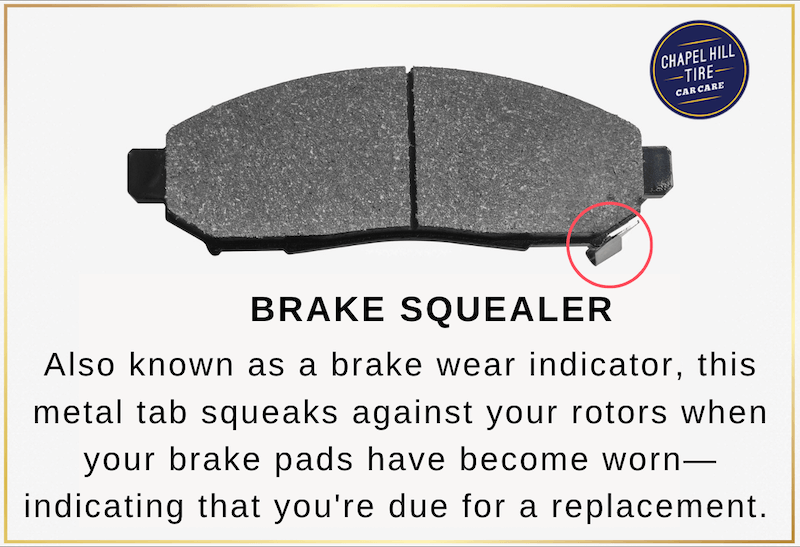From your dashboard warning lights to your tread wear indicator bars—your car has clever ways of telling you when it needs service. Here is one less commonly-known device: the brake wear indicator. Your local mechanics at Chapel Hill Tire are here with insight.
A Quick Guide to Brake Wear Indicators
So what exactly are brake wear indicators? Brake wear indicators (also known as squealers) are elements of your brake pads designed to squeak once the layers of your brake pads are worn out.
Yes, you read that right. Drivers are often surprised to learn that their squeaky brakes are designed to sound that way. Effective braking is vital to staying safe on the road (and passing your inspection). Brake wear indicators are one way your car lets you know that your brake pads are becoming dangerously low.

How Do Brake Pad Indicators Work?
So how do these brake wear indicators work? The squealers are metal tabs that protrude to the safe level of brake pad thickness. These elements can be found on the side of your brake pads (as in the picture above) or embedded within the friction material.
Once your brake pads dip below the safe levels of thickness, this metal squealer will come in contact with your metal rotor—creating loud grinding, scraping, or (as you might have guessed) squeaking sounds.
Let’s Take a Closer Look at Squeaky Brakes
When your brakes become squeaky, it is often a result of your brake pad wear indicators going to work—letting you know you are due for a replacement. However, there are a few other potential reasons why your brakes might be squeaking:
1) Rusty Brakes
If your car has been dormant during periods of rain, moisture, or humidity, your braking system may be a little rusty. Usually, squeaking noises caused by rust will wear away after driving your vehicle for a bit.
2) Metallic Brake Pads
As vehicles become larger and heavier, they require more braking strength. Some newer brake pads provide this extra reinforcement using metallic or semi-metallic friction material. With a metallic composition of up to 70%, these brake pads can naturally make squeaky sounds when braking. While it might be unpleasant to hear, these cases of squeaky brakes are no cause for concern.
3) Debris in Brakes
Twigs, mud, and debris can get wedged between your rotors and brake pads—causing squeaking and other unusual sounds. While this is less common, a routine brake check-up will reveal and clear any debris.
4) Calipers Sticking
Sticky calipers are another potential culprit of squeaky brakes. If your squeaky brakes are paired with unusual brake functioning, visit a mechanic as soon as possible. One signature sign of sticky calipers is when a vehicle pulls to one side while braking. While it is especially uncommon, this is the most severe cause of squeaky brakes.
If you are unsure of the source of your squeaky brakes, bring your car to a local mechanic. Better yet—you can also have our mechanics come to you with our pick-up and delivery service.
Chapel Hill Tire: Brake Pad Replacement Services Near Me
When you find your brakes squeaking, the experts at Chapel Hill Tire can help. We offer comprehensive brake services, including brake inspections, brake pad replacements, braking fluid flushes, rotor replacement, caliper services, and so many others. Our professionals are here to get you in, out, and Driving Happy on the road.
Chapel Hill Tire is a network of mechanics locations across the greater Triangle area—with 9 shops across Apex, Raleigh, Chapel Hill, Durham, and Carrboro. Our professional mechanics also commonly serve nearby areas, including Knightdale, Cary, Pittsboro, Wake Forest, Hillsborough, Morrisville, and beyond. We invite you to make an appointment, browse our coupons, or give us a call to get started today!